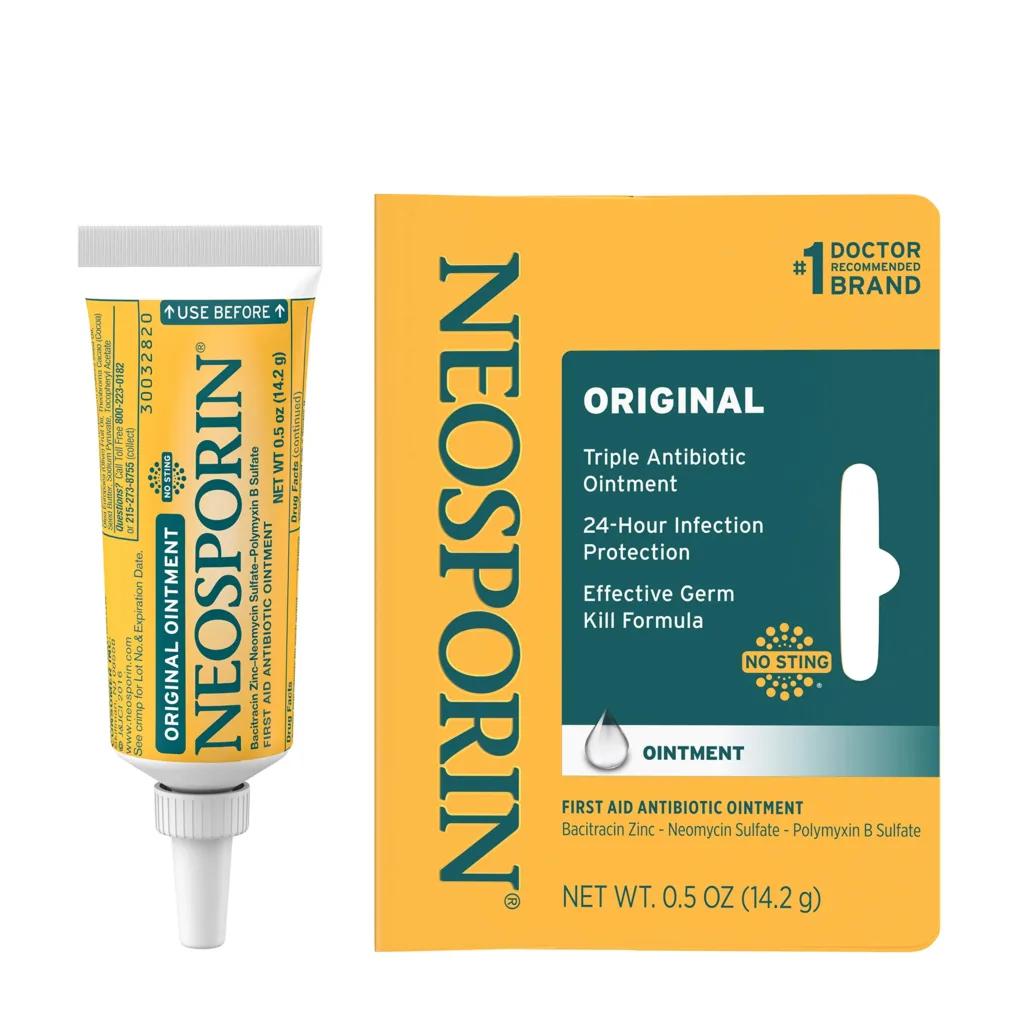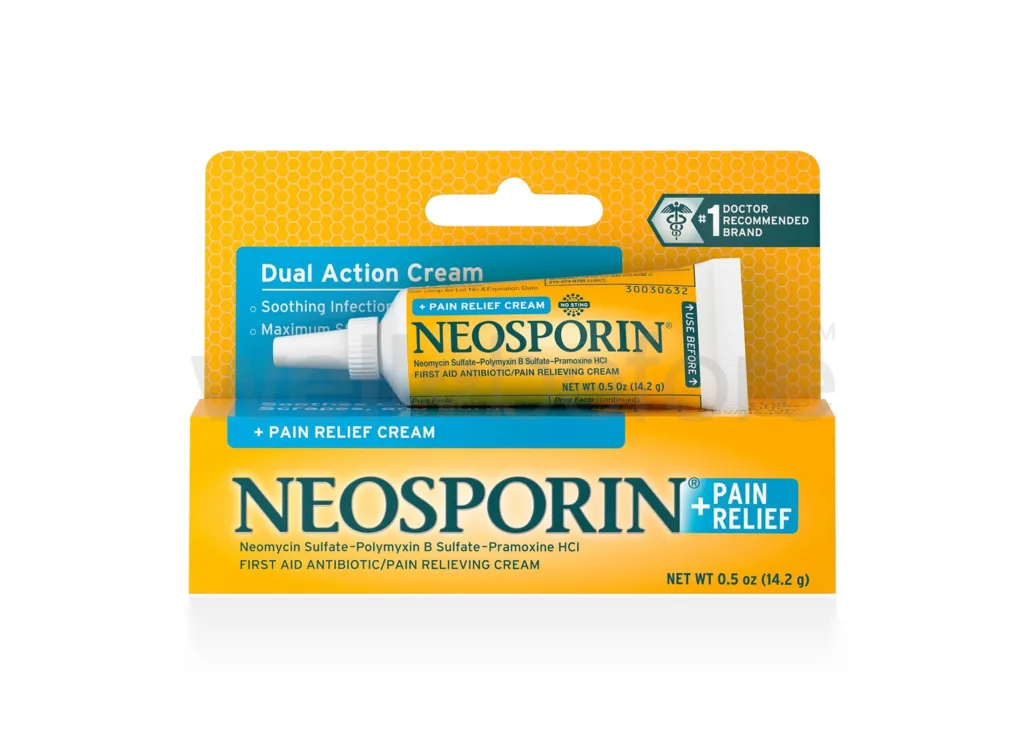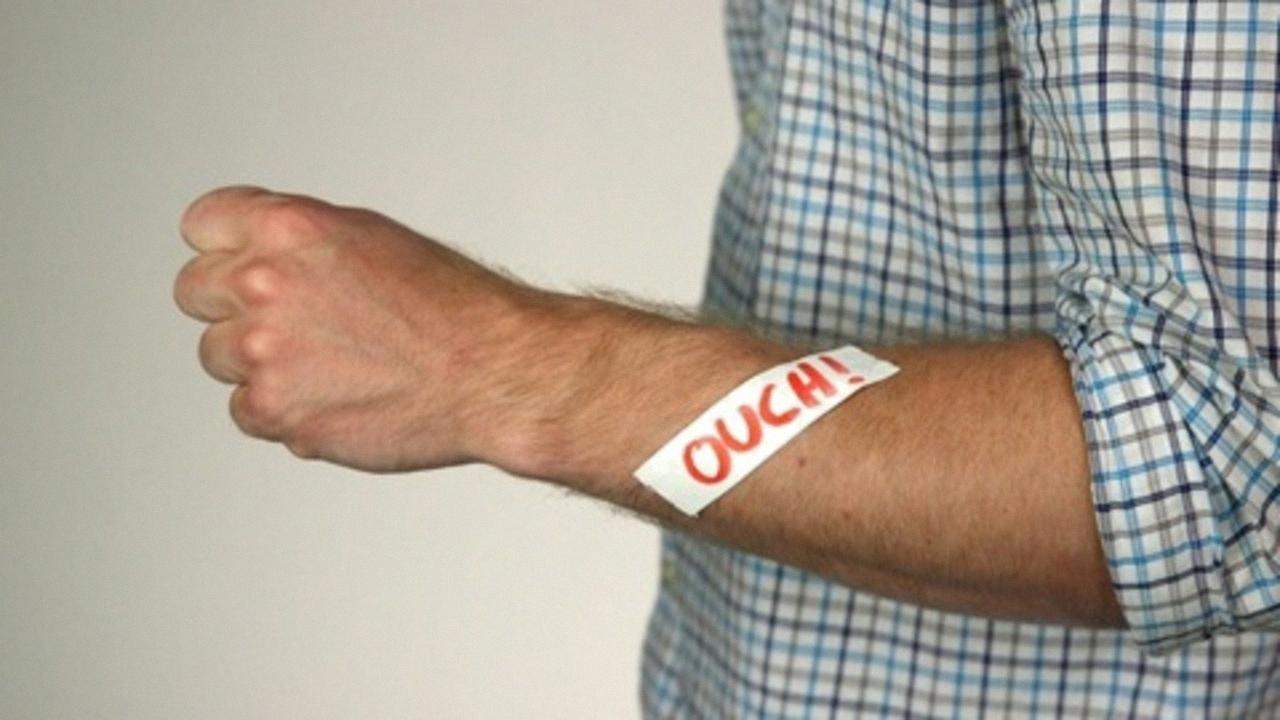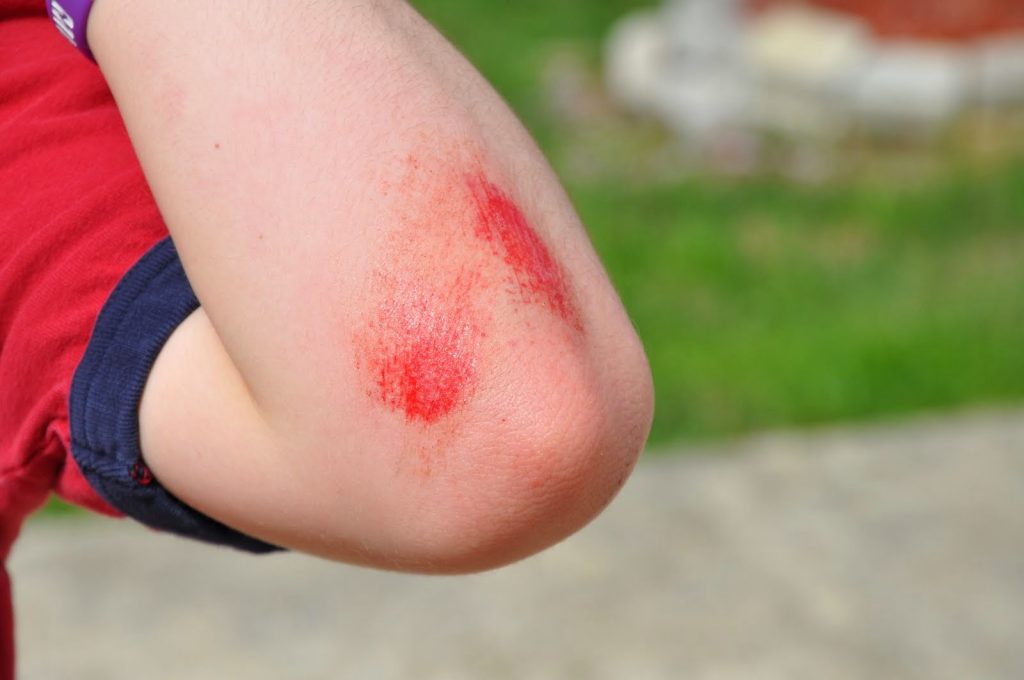As a first-aid staple, Neosporin topical ointment is a go-to solution for treating cuts, scrapes, and minor wounds. However, if you’re wondering if it’s safe to use after its expiration date, the answer may surprise you.
Expired medical products can be less effective or even risky due to a change in chemical composition or a decrease in strength. Certain expired medications are at risk of bacterial growth, and sub-potent antibiotics can fail to treat infections, leading to more serious illnesses and antibiotic resistance.
So, does Neosporin expire? The short answer is yes. Like all medications, Neosporin has an expiration date printed on the package. However, if you’re treating a wound that’s infected, or if the wound still looks dirty after washing it, our experts say it’s fine to use Neosporin topical ointment within a year after it’s expired.
But what makes Neosporin effective in the firt place? Neosporin contains three active ingredients: bacitracin, neomycin, and polymyxin B. Bacitracin stops bacterial growth, while the antibiotics in Neosporin stop bacterial growth and also kill existing bacteria. This makes Neosporin a powerful tool in the fight against infections.
However, it’s important to note that the neomycin in Neosporin can cause allergic reactions of the skin called contact dermatitis. It can cause the skin to become red, scaly, and itchy. The more Neosporin you use, the worse the skin reaction gets.
So, if you do decide to use expired Neosporin, be sure to keep an eye out for any signs of an allergic reaction. If you notice redness, swelling, or itching, stop using the ointment immediately and seek medical attention if necessary.
While Neosporin does expire, it’s usually safe to use within a year after its expiration date if you’re treating an infected wound. However, be mindful of any potential allergic reactions and discontinue use if necessary. As always, it’s best to consult with a healthcare professional if you have any concerns about using expired medications.
The Shelf Life of Neosporin After Its Expiration Date
Neosporin topical ointment is generally considered safe to use within a year after its expiration date. However, it is important to note that the effectiveness of the ointment may be reduced over time, espcially if it has not been stored properly. If you are treating a wound that is infected or appears dirty, and the Neosporin you have on hand is past its expiration date, it is still better to use it than to leave the wound untreated. However, if you have a fresh wound that is not infected, it is ideal to use a new, unexpired tube of Neosporin to ensure maximum effectiveness. Ultimately, if you have any concerns about using expired Neosporin or if your wound does not improve after applying it, it is best to consult a healthcare professional.

The Effects of Using Expired Antibiotic Ointment
If you use expired antibiotic ointment, it may not effectively treat the bacterial infection that you are trying to cure. The effectiveness of the antibiotic ointment can decrease over time as the chemical composition of the ointment changes. In addition, expired antibiotic ointment can be at risk of bacterial growth, which could make the ointment contaminated and potentially cuse more harm than good. Moreover, using sub-potent antibiotics can lead to antibiotic resistance, a serious public health concern. Therefore, it is important to always check the expiration date of any medication, including antibiotic ointments, prior to use, and to dispose of it properly if expired.
Can Bacteria Grow on Neosporin?
It is highly unlikely for bacteria to grow in Neosporin due to its active ingredients. Neosporin contains three antibiotics: bacitracin, neomycin, and polymyxin B, which work together to kill bacteria and prevent their growth. Bacitracin stops bacterial growth, while neomycin and polymyxin B kill existing bacteria. Therefore, the combination of these antibiotics makes it difficult for bacteria to grow in Neosporin. However, it is crucial to store Neosporin properly and use it before its expiration date to ensure its effectiveness.
The Discontinuation of Neosporin Recommendation
Neosporin is no longer recommended due to severl reasons. Firstly, the overuse of Neosporin can lead to the development of antibiotic-resistant bacteria, which can make infections harder to treat. Secondly, many people are allergic to one or more of the ingredients in Neosporin, such as neomycin, which can cause contact dermatitis. Thirdly, there are now many alternative treatments available that are just as effective and less likely to cause adverse reactions. Neosporin is not recommended for use on deep or puncture wounds, animal bites, or serious burns, as it can delay healing and increase the risk of infection. Therefore, it is always recommended to consult a healthcare professional before using any medication or treatment.
How Long is an Antibiotic Ointment Effective?
Antibiotic ointments typically have an expiration date that is printed on the packaging. It is important to check the expiration date befre using the ointment. Once opened, antibiotic ointments can be used for up to one year, but this can vary depending on the specific product. It is important to follow the instructions provided by your healthcare provider or pharmacist regarding the length of time the ointment should be used. In general, it is recommended to use antibiotic ointments for up to seven days only to avoid the risk of antibiotic resistance. After this time, any unused ointment should be discarded. It is also important to store antibiotic ointments properly, in a cool, dry place, and to keep them out of reach of children.

Do Antibacterial Ointments Have an Expiration Date?
Antibacterial ointments do expire. Just like other medications, ointments contain active ingredients that lose their potency over time. The expiration date on the packaging indicates the point beyond which the manufacturer cannot guarantee the effectiveness and safety of the product. Using expired antibacterial ointments may not only be ineffective in treating infections but can also lead to adverse reactions, such as allergic reactions or skin irritation. Therefore, it is important to check the expiration date before using any antibacterial ointment and to discard it once it has expired.
Toxicity of Expired Antibiotics
The tetracycline class of antibiotics, which includes drugs like doxycycline and minocycline, can become toxic when expired. This means that ingesting them after their expiration date can lead to a dangerous syndrome that damages the kidneys. It is important to always check the expiration date of medications and dispose of them properly if they have expired.
Alternative Uses for Neosporin
If you are looking for an alternative to Neosporin, there are several options available that can be just as effective. One alternative is bacitracin, which is a topical antibiotic that works similarly to Neosporin but contains only one antibiotic ingredient. Another option is petroleum jelly products, such as Vaseline, which can keep wounds from drying out and prevent itching and other unpleasant symptoms. Additionally, there are various natural remedies that can be used for minor wounds, including honey, tea tree oil, and aloe vera. It’s important to note that for more serous wounds or infections, it’s always best to consult with a healthcare professional for proper treatment.
The Effectiveness of Neosporin in Fighting Infection
Neosporin can help fight against infection caused by minor cuts, burns or scrapes. Neosporin contains three different antibiotics (bacitracin, polymyxin B, and neomycin) that work together to prevent the growth of bacteria. These antibiotics target a wide range of bacteria, including both gram-positive and gram-negative bacteria. When applied to a wound, Neosporin helps to create a barrier against infection, reducing the risk of further contamination and promoting faster healing. However, it is important to note that Neosporin is not effective against all types of bacteria, and shold only be used as directed and for minor wounds. In more serious cases of infection or for wounds that are not healing properly, it is important to seek medical attention from a healthcare professional.

Source: consumerreports.org
The Effects of Using Expired Neosporin
Using expired Neosporin can be unsafe and risky. The effectiveness of the product may not be guaranteed, as the active ingredients in the ointment may have degraded over time. This means that the expired Neosporin may not work as effectively in preventing infection or treating wounds. Additionally, expired Neosporin may also cause skin irritation, allergic reactions, and other adverse side effects. It is important to properly discard any expired Neosporin and obtain a new product to ensure maximum efficacy and safety.
When Is It Not Safe to Use Neosporin on a Wound?
While Neosporin is an effective over-the-counter medication for treating minor skin wounds, there are situations when it should not be used. For instance, if the wound is large or deep, it requires medical attention from a healthcare provider. Neosporin should not be used as a substitute for professional medical care, and delaying treatment for a serious wound could lead to futher complications. Additionally, if you are allergic to any of the ingredients in Neosporin, you should not use it. Allergic reactions may result in redness, itching, swelling, or even difficulty breathing. In such cases, it is recommended to seek medical attention immediately. Moreover, Neosporin should not be applied to burns, animal bites, or puncture wounds, as they may require specialized treatment. while Neosporin is a useful medication for minor skin wounds, it is important to recognize when it should not be used and seek professional medical care when necessary.
Which Is Better for Cuts: Vaseline or Neosporin?
When it comes to treating cuts, both Vaseline and Neosporin have their own benefits. Vaseline is a petroleum-based product that helps to create a barrier over the wound, preventing dirt and bacteria from entering the cut. This barrier also helps to keep the wound moist, which can aid in the healing process. On the other hand, Neosporin is an antibiotic ointment that works to kill bacteria and prevent infection.
While Neosporin may seem like the better option, a study conducted by Dr. Joseph C. Garza showed that Vaseline may actully be more effective in aiding the healing process. The study found that participants who applied Vaseline to small skin wounds healed faster than those who applied Neosporin. This suggests that Neosporin may kill off some of the good bacteria that is necessary for the healing process, ultimately slowing down the healing time.
Both Vaseline and Neosporin have their own benefits and can be effective in treating cuts. However, based on the findings of Dr. Garza’s study, it may be more beneficial to use Vaseline over Neosporin for faster healing. As always, it is important to keep any wound clean and seek medical attention if necessary.
The Effectiveness of Neosporin in Facilitating the Healing of Cuts
Neosporin is an over-the-counter antibiotic ointment that can be applied to cuts, scrapes, and other minor injuries. It contains thee active ingredients: neomycin, polymyxin B, and bacitracin, which work together to prevent infections caused by bacteria. While there is some evidence that Neosporin can help wounds heal faster by preventing infections, this is not always the case. In fact, some studies suggest that using Neosporin may actually slow down the healing process in certain types of wounds. Therefore, it is important to follow the instructions on the product label and to consult with a healthcare professional if you have any concerns about the use of Neosporin or the healing process of your wound. In general, keeping the wound clean and moist, covering it with a sterile bandage, and monitoring it for signs of infection are all important steps in promoting healing.

What Alternatives to Neosporin Do Dermatologists Recommend?
Dermatologists often recommend Polysporin instead of Neosporin. This is because Polysporin contains only two ingredients, polymyxin B sulfate and bacitracin zinc, wereas Neosporin contains three active ingredients, including neomycin sulfate which can cause allergic reactions in some individuals. Additionally, when the skin is cut or open, it is more susceptible to developing sensitivities and allergies to topical treatments. Therefore, Polysporin is a safer alternative for treating minor cuts, scrapes, and burns. It is always advisable to consult with a dermatologist or healthcare provider before using any topical medication to ensure that it is safe and effective for your specific needs.
Using Neosporin on Open Wounds
You can put NEOSPORIN® on an open wound. In fact, it is recommended to apply an antibiotic ointment like NEOSPORIN® to the affected area after cleaning the wound. The antibiotic ointment will help kill bacteria and prevent infection, allowing the wound to heal faster. It is important to remember to apply only a thin layer of the ointment and to cover the wound with a sterile bandage to keep it clean and protected. However, if the wound is deep or severe, it is best to seek medical attention.
Conclusion
While uing expired medical products can be risky, Neosporin topical ointment can still be effective in treating infected wounds or wounds that still appear dirty after washing, within a year after its expiration date. Neosporin contains three active ingredients: bacitracin, neomycin, and polymyxin B, which work together to stop bacterial growth and kill existing bacteria. However, it’s important to note that neomycin, one of the active ingredients in Neosporin, can cause allergic reactions of the skin called contact dermatitis, which can worsen with continued use. Therefore, it’s essential to read the label and follow the instructions carefully to avoid any adverse effects. using Neosporin within its expiration date can be a safe and effective way to treat wounds, but always consult with a healthcare professional if there are any concerns or if symptoms worsen.
